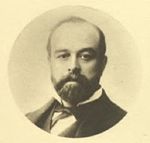
In the 1884 appeal heard before Chief Justice Begie in regards to the dispute of mining claims at Big Ledge, Theodore had originally agreed to represent Sproule and his party. Unfortunately, Theodore was called away at the last minute on pressing government business, leaving Sproule with some lesser light to argue his case. In Theodore's absence, Sproule might well have had his heart set on Baillie-Grohman's representation. After all, Grohman had successfully defended his interests before Gold Commissioner Kelly a year earlier. But Grohman too was unavailable, away on one of his many trips to England early in 1884.
In the end, Theodore Davie was able to represent Sproule but, this time, defending him on a murder charge. Starting on December 2, 1885, Theodore Davie faced off against his brother, then Attorney-General of the province, in what was regarded as one of the most high profile cases ever to be argued in a British Columbia court.
Even after Sproule's conviction, Theodore continued to represent Sproule, traveling as far as Ottawa, seeking a re-trial or, at worst, a commutation of the death sentence.
Originally Sproule had been sentenced to be hanged on January 5, 1885. Thanks to a long list of appeals, legal wranglings and last minute reprieves, Sproule's sentence was not carried out until October 29, 1886.
In 1889, Theodore Davie became Attorney-General , and went on to become premier himself in 1892. He resigned from that office three years later to become Chief Justice, succeeding the legendary Matthew Baillie Begbie.
